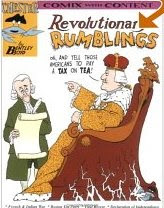from wikipedia, this segment is from scene 3
As the argument between the delegates grows more heated, Dickinson launches into a long tirade against Adams and his supporters, calling him an agitator and a madman. Adams lashes back by accusing Dickinson and his fellow conservative "cool, considerate men" of hanging to the rear of every issue to see who will triumph; this results in a physical fight breaking out. Caesar Rodney of Delaware separates the two and berates them for not focusing on the real enemy: England. He collapses from the overexertion; he has cancer. Colonel McKean offers to take him back home. This leaves the Delaware delegation with only one man present, George Read, and he is not in favor of independence. Rutledge, seeing the majority swinging in his favor, moves for a vote on the question of independence. Franklin seeks to stall the motion, and asks that the resolution be read aloud again. As Thomson is reading it, the new New Jersey delegation arrives, led by Rev. John Witherspoon. He informs the Congress that they have been instructed to vote in favor of independence. The vote is now six for independence and six against (with New York's usual "courteous" abstention), and Adams reminds Hancock of his duty as President to break all ties. Seeing that the resolution might pass, Dickinson moves that any vote for independence must pass unanimously on the grounds that "no colony [may] be torn from its mother country without its own consent." His motion is seconded by Read, and the vote produces the same tie, which Hancock breaks by voting for unanimity. His reasoning is that without consent of all the colonies, any of them voting against independence would likely be forced to fight on England's side, and that the new nation would "carry as its emblem the mark of Cain."
The vote for independence is called again, and Adams, knowing that the vote will not be unanimous, calls for a postponement (much to the irritation of Thomson, who has now made four unsuccessful attempts to call the vote). He expresses the need for time for composing of some sort of declaration defining the reasons for independence. Franklin seconds Adams, but when asked point-blank why such a declaration should be written and what its point would be, Adams and Franklin are lost for words. Suddenly, a voice proclaims the reason: "to place before mankind the common sense of the subject, in terms so plain and firm as to command their assent" — Thomas Jefferson has come to the rescue. The vote on postponement is called, producing yet another tie, with New York abstaining again (Morris explains that his delegation has never gotten any instructions on anything from the New York legislature because "they speak very fast and very loud and nobody listens to anybody else with the result that nothing ever gets done."). Hancock breaks the tie by voting in favor of postponement, choosing a committee of Adams, Franklin, Lee, Roger Sherman of Connecticut, and Robert Livingston of New York to draft the declaration. Hancock announces that it must be written, debated, and passed by the beginning of July — a mere three weeks away. Lee declines to serve on the declaration committee, having been elected Governor of Virginia, and Adams immediately suggests that Jefferson take Lee's place on the committee. Hancock agrees, almost as an afterthought, and adjourns the session over Jefferson's complaints that he must go home to his wife.
The Committee of Five argues about who should bear the responsibility for writing the declaration (But, Mr. Adams). Franklin suggests that Adams write it, but he declines, reminding Franklin that he is "obnoxious and disliked" and that anything he writes is bound to be rejected by the other delegates. Adams in turn suggests Franklin, as an accomplished writer, but Franklin argues that he is not a political writer, only a satirist. Adams turns to Sherman who claims that he's not a writer at all, but "a simple cobbler from Connecticut." Livingston is next to decline, as he must return to New York to celebrate the birth of his son. All eyes turn to Jefferson; Adams praises his writing and quotes a passage of Jefferson's Declaration of the Causes and Necessity of Taking Up Arms, bluntly telling Jefferson that he is the best writer in Congress. Jefferson still tries to wriggle out of the responsibility, pleading that he has not seen his wife in six months, and begs to be let out of the task of composing the declaration. Adams, however, is unmoved by Jefferson's arguments, as Adams also misses his own wife but he understands the need at the moment to serve the colonies, and thrusts a quill pen into Jefferson's hand. Jefferson, defeated, accepts the duty of drafting the document, though not before lambasting Adams on his way out.








0 Comments:
Post a Comment